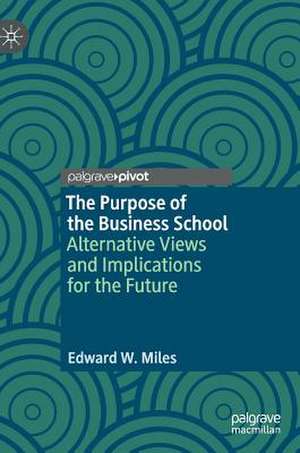The Purpose of the Business School: Alternative Views and Implications for the Future
Autor Edward W. Milesen Limba Engleză Hardback – 4 apr 2019
This book engages these debates, arguing that all judgments about the effectiveness of business schools are rooted in assumptions about what the purposes of the business school appropriately are and that many of those assumptions are unstated and not subjected to debate. The author weaves a unique blend of complexity theory, philosophy of science, and the nature of professions to articulate those goals and assess the effectiveness at meeting them.
The book traces parallel discussions regarding the purpose of the university in the writings of Aristotle and Wilhelm von Humboldt and ties those discussions to current debates. This book will inform business faculty and administrators of the degree to which university-based business schools are balancing multiple purposes which include discovery of knowledge, creating knowledge that informs the practice of business, training professionals, and instilling ethical principles in its training of those professionals.
Preț: 385.25 lei
Nou
Puncte Express: 578
Preț estimativ în valută:
73.73€ • 80.06$ • 61.93£
73.73€ • 80.06$ • 61.93£
Carte tipărită la comandă
Livrare economică 23 aprilie-07 mai
Preluare comenzi: 021 569.72.76
Specificații
ISBN-13: 9783030157807
ISBN-10: 3030157806
Pagini: 136
Ilustrații: XV, 147 p. 1 illus.
Dimensiuni: 148 x 210 mm
Greutate: 0.35 kg
Ediția:1st ed. 2019
Editura: Springer International Publishing
Colecția Palgrave Pivot
Locul publicării:Cham, Switzerland
ISBN-10: 3030157806
Pagini: 136
Ilustrații: XV, 147 p. 1 illus.
Dimensiuni: 148 x 210 mm
Greutate: 0.35 kg
Ediția:1st ed. 2019
Editura: Springer International Publishing
Colecția Palgrave Pivot
Locul publicării:Cham, Switzerland
Cuprins
1. Let’s Don’t Start Here.- 2. Shifting Emphases among Aristotle’s Criteria: Two Key Historical Occurrences.- 3. Wissenschaft.- 4. Approaching the Study of Business and Management as Science.- 5. But Is Business Management a Science.- 6. Section II Epilogue.- 7. Approaching the Study of Business and Management as a Profession.- 8. But Is Business Management a Profession.- 9. Section III Epilogue.- 10. SWOT Analysis of Four Espoused Business School Goals.- 11. How Are We Doing 60 Years Later.
Notă biografică
Edward W. Miles is Associate Professor in the Robinson College of Business at Georgia State University, USA. He is the author of a recent book The Past, Present, and Future of the Business School (2016).
Textul de pe ultima copertă
In the mid-20th century, university-based business schools re-oriented themselves to increased alignment with the preferences of the university and decreased alignment with the preferences of business. This re-alignment has caused multiple observers to question the effectiveness of current-day business schools. For example, recent discussions have lamented that business schools are engaged in research that does not influence the practice of business.
This book engages these debates, arguing that all judgments about the effectiveness of business schools are rooted in assumptions about what the purposes of the business school appropriately are and that many of those assumptions are unstated and not subjected to debate. The author weaves a unique blend of complexity theory, philosophy of science, and the nature of professions to articulate those goals and assess the effectiveness at meeting them.
The book traces parallel discussions regarding the purpose of the university in the writings of Aristotle and Wilhelm von Humboldt and ties those discussions to current debates. This book will inform business faculty and administrators of the degree to which university-based business schools are balancing multiple purposes which include discovery of knowledge, creating knowledge that informs the practice of business, training professionals, and instilling ethical principles in its training of those professionals.
This book engages these debates, arguing that all judgments about the effectiveness of business schools are rooted in assumptions about what the purposes of the business school appropriately are and that many of those assumptions are unstated and not subjected to debate. The author weaves a unique blend of complexity theory, philosophy of science, and the nature of professions to articulate those goals and assess the effectiveness at meeting them.
The book traces parallel discussions regarding the purpose of the university in the writings of Aristotle and Wilhelm von Humboldt and ties those discussions to current debates. This book will inform business faculty and administrators of the degree to which university-based business schools are balancing multiple purposes which include discovery of knowledge, creating knowledge that informs the practice of business, training professionals, and instilling ethical principles in its training of those professionals.
Caracteristici
Addresses more centrally the role of scholarship within the business school and the tensions of the need to satisfy the dual constituents of the university and the profession Addresses the question of whether business management should be considered a science, drawing in part from complexity theory and philosophy of science. Discusses multiple purposes and discusses successes versus failures over the last 60 years.
